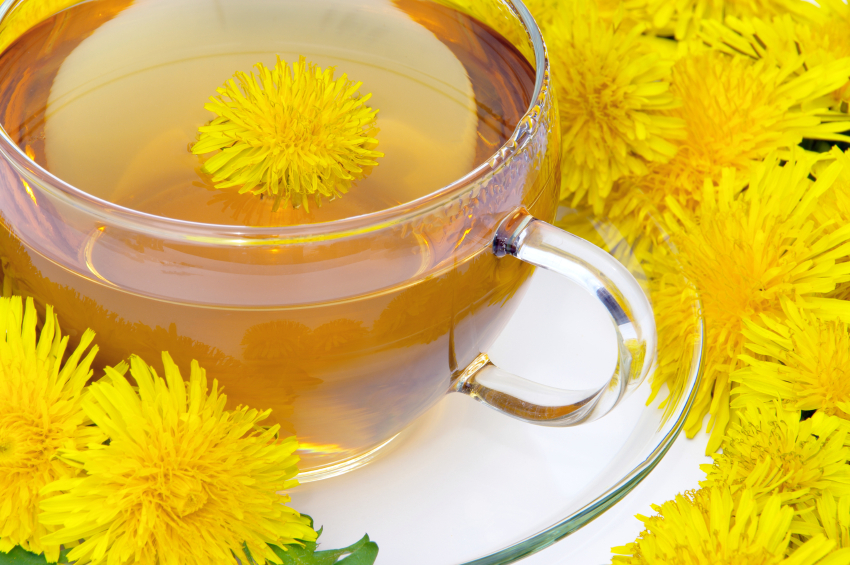 Dandelions are more than just weeds. The leaves and roots of dandelions have been used in herbal medicine for centuries, especially for regulating the liver and stimulating the digestive system.
Dandelions are more than just weeds. The leaves and roots of dandelions have been used in herbal medicine for centuries, especially for regulating the liver and stimulating the digestive system.
A dandelion tea detox or a dandelion tea cleanse is made from the root of the common dandelion plant, which is part of the Asteraceae family. There are several species of dandelion, but the most common is Taraxacum officinale.
Fun fact: the word dandelion comes from the French dent-de-lion, which means lion’s tooth.
Nutritional Analysis of Dandelion Tea
It may surprise you to learn that dandelions are actually quite healthy to consume, despite their reputation as the bane of suburban landscapers. Dandelion roots, greens, flowers, and stems can all be made into a delicious and healthy tea.
Why is dandelion tea good for you? Let’s take a look at the nutritional information of dandelion greens. The greens are loaded with vitamin K. In fact, they contain 535% of your daily value in just one cup. Other key nutrients include fiber, vitamin A, vitamin C, calcium, iron, magnesium, copper, manganese, and B vitamins such as B1, B2, B3, B6, and folate. It also contains electrolytes such as potassium and sodium.
Dandelion root is a nutritional powerhouse, and among its active ingredients are inulin and sesquiterpene lactones. Other important nutrients include potassium, iron, calcium, boron, silicon, manganese, copper, folate, vitamin B2, vitamin B6, and vitamin C.

Dandelion detox tea can be safely made from nine to 12 grams, or
two to three teaspoons, of dandelion root.
Should You Detox with Dandelion Tea?
There is nothing more cleansing than a dandelion detox tea, especially when you’re feeling tired or bloated. But should you jump on board the bandwagon?
As mentioned, dandelion root tea is a great way to detoxify the liver, because the special compounds (such as sesquiterpene lactones) in the root help cleanse it by increasing bile production and improving overall digestion.
But to understand why you should detox with dandelion tea, it’s necessary to appreciate the importance of the liver. The liver is by far one of the most essential organs in the body due to its role in body metabolism and digestion. It’s the largest internal organ in the body, and it’s responsible for hundreds of chemical reactions that help you survive, including cleaning your blood, manufacturing cholesterol and triglycerides, producing bile, and storing energy in the form of glycogen. The liver also stores some of the nutrients found in dandelion root, including folate, iron, vitamin B12, vitamin A, vitamin D, and vitamin K.
Reasons to Drink Dandelion Tea
Dandelion has long been used in folk medicine as a liver tonic. Some scientific evidence has also backed up the claim that dandelion contains diuretic and liver-detoxifying properties, which is why naturopathic doctors and holistic practitioners praise dandelion root tea as a liver detoxifier. Besides the role of dandelion tea in digestion, there are other good reasons to drink it, such as:
It reduces water weight:
It can help you lose water weight due to its diuretic effect. A study published in the Journal of Alternative and Complementary Medicine in 2009 even supported the notion that dandelion extract increases urine output after two one-cup servings of dandelion leaf tea.
It helps with weight loss:
Besides its diuretic effect, evidence published in the journal Nutrition Research and Practice in 2008 using mice suggests that dandelion benefits weight loss in a similar way as Orlistat, a weight-loss drug. Orlistat inhibits pancreatic lipase, which an enzyme released during digestion while breaking down fat.
It can replace coffee:
Many believe that dandelion tea resembles coffee in taste and appearance. Dandelion root tea can be a perfect coffee replacement—as long as you don’t mind that it’s caffeine-free.

Other Possible Health Benefits of Dandelion Tea
There are also several other dandelion tea benefits, including:
1. May Benefit Digestive Problems
Besides the effect it has on the liver, a dandelion root tea detox is also thought to have other positive effects on the digestive system. It’s suggested that dandelion root tea can improve appetite and treat minor digestive complaints such as constipation. Dandelion detox tea is rich in fiber, which helps prevent digestive disorders such as diverticulosis and irritable bowel syndrome.
2. Could Help Kill Cancer
Dandelion greens also contain antioxidants such as vitamins A and C, which can help fight cancer. Dandelion root is also praised for its anti-cancer potential. In a study published in the journal Evidence-Based Complementary and Alternative Medicine in 2010, dandelion root extract induced cell death in melanoma cells without destroying non-cancerous cells. Another study published in the journal Pancreas in 2012 showed the same effect, but on pancreatic cancer cells.
3. Excellent for Bone Health
The calcium in dandelion roots or leaves can help strengthen your bones and teeth. Vitamin K in dandelion greens also plays an important role in bone health, as it can help prevent bone fractures, especially in postmenopausal women at risk of osteoporosis.
4. Prevents Urinary Tract Infections
The diuretic effect of dandelion tea can also help purify the bladder and kidneys, while reducing the risk of urinary tract infections, and may even prevent cysts on reproductive organs. Dandelion tea can also pair with the herb uva ursi to help prevent urinary tract infections; this is because of the antibacterial effect of uva ursi and the diuretic effect of dandelion.
5. Natural Diabetes Remedy
Dandelion tea benefits diabetics by stimulating insulin production and maintaining low blood sugar levels. The diuretic effect of dandelion tea is also thought to remove excess sugar in the body.
6. Fights Skin Infections
The milky white sap found in the dandelion stem is considered great for the skin. Dandelion stem sap is full of fungicidal, insecticidal, and germicidal properties, which can help relieve irritation or itching due to psoriasis, eczema, or other skin infections.
How Much Dandelion Tea Is Safe to Consume?
Dandelion root is available as a powdered extract, a tincture, or tea; however, when cleansing or detoxifying, the tea is the best option. To make the tea, simply put a tea bag of store-bought dandelion tea into a mug of hot water, and steep for a minimum of 10 minutes. You can also use loose dandelion root, leaves, or flowers to make your dandelion tea. Dandelion detox tea can be safely made from nine to 12 grams, or two to three teaspoons, of dandelion root. You can safely consume your dandelion tea cleanse three to four times a day.
Healthy Dandelion Recipes
To enhance your dandelion tea detox recipe, it’s a good idea to add lemon juice or cranberry juice for a more efficient liver cleanse. There are a number of ways you can incorporate dandelion into your diet besides the tea. It’s especially detoxifying to combine other liver-cleansing foods such as broccoli, parsley, or cilantro to the mix. The following are a couple of easy dandelion recipes that you can add to your meal plan rotation:
Recipe 1: Sautéed Dandelion Greens with Broccoli
Ingredients
- 1 large bunch of dandelion greens
- 4 tbsp olive oil
- 3 cups broccoli, steamed
- 1 large garlic clove, chopped
- Parsley (for garnish)
- A dash of red pepper flakes
- Salt and pepper to taste
Directions
- Rinse dandelion greens and squeeze dry to remove excess water.
- Cut the greens into three-inch pieces, and sauté in a large pan with olive and garlic for about 10 minutes, or until tender.
- Add the steamed broccoli, salt, pepper, and red pepper flakes, and garnish with parsley.
Recipe 2: Cilantro and Dandelion Greens Pesto
Ingredients
- 3/4 cup dandelion greens
- 1/2 cup fresh cilantro
- 6 tbsp melted virgin coconut oil
- 2 tbsp fresh lemon juice
- 1 cup raw walnuts
Directions
- Combine all the ingredients in a blender and blend until smooth.
Enjoy the pesto in salads or with brown rice and quinoa pasta. You can also enjoy it as a snack with crackers, along with your dandelion detox tea for the ultimate detoxification.

Possible Side Effects of Dandelion Tea
Although there are many health benefits to dandelion tea, there are also some dandelion tea detox side effects to keep in mind. It’s important to talk to your doctor to confirm whether dandelion is safe for you due to its possible interaction with certain medications. Here are some dandelion tea detox side effects and interactions:
- Dandelion root tea may negatively impact digestion and cause diarrhea, heartburn, or stomach inflammation.
- Some people are allergic to dandelion, especially if they are allergic to ragweed or related plants such as marigolds, chrysanthemums, or daisies.
- Dandelion may interact with antibiotics such as ciprofloxacin, norfloxacin, sparfloxacin, trovafloxacin, grepafloxacin, and enoxacin.
- Dandelion may also interact with diuretic pills due to the diuretic effect of the herb.
- Dandelion may also reduce how quickly the liver breaks down certain medications such as propranolol, theophylline, verapamil, ondansetron, haloperidol, and amitriptyline.
Dandelion Detox Tea: Key Points to Remember
Dandelion detox tea is a great addition for any cleanse or detoxification program. The following are a few key takeaways you should remember about dandelion and dandelion tea:
- Dandelion may help cleanse the liver due to special compounds called sesquiterpene lactones.
- Dandelion is a great herbal replacement for coffee that also helps with detoxification.
- Various dandelion benefits include reducing water weight, digestive and diabetic benefits, preventing urinary tract infections and bone problems, and fighting skin infections and cancer.
- It’s safe to consume nine to 12 grams of dandelion root each day in tea form.
Sources for Today’s Article:
Callahan, C., “Nutritional Information on Dandelion Root,” Livestrong web site, last updated August 26, 2015; http://www.livestrong.com/article/174470-nutritional-information-on-dandelion-root/, last accessed April 26, 2016.
Wedro, B., “Anatomy and Function of the Liver,” Medicine Net web site; http://www.medicinenet.com/liver_anatomy_and_function/article.htm, last accessed April 26, 2016.
Uren, M., “8 Reasons to Drink Dandelion Root Tea,” Mind Body Green web site, December 17, 2012; http://www.mindbodygreen.com/0-7134/8-reasons-to-drink-dandelion-root-tea.html, last accessed April 26, 2016.
Schaefer, A., “7 Ways Dandelion Tea Could Be Good for You,” Healthline web site, last reviewed March 31, 2015; http://www.healthline.com/health/ways-dandelion-tea-could-be-good-for-your, last accessed April 26, 2016.
Martinac, P., “Side Effects of Drinking Dandelion Root Tea,” Livestrong web site, last updated March 3, 2016; http://www.livestrong.com/article/312630-side-effects-of-drinking-dandelion-root-tea/, last accessed April 26, 2016.
“Sauteed Dandelion Greens,” Italian Food Forever website, May 29, 2008; http://www.italianfoodforever.com/2008/05/sauted-dandelion-greens/, last accessed April 26, 2016.
Clare, B.A., et al, “The Diuretic Effect in Human Subjects of an Extract of Taraxacum officinale Folium over a Single Day,” Journal of Alternative and Complementary Medicine, 2009; doi:10.1089/acm.2008.0152.
Zhang, J., et al, “Pancreatic Lipase Inhibitory Activity of Taraxacum officinale in Vitro and in Vivo,” Nutrition Research and Practice, 2008; doi:10.4162/nrp.2008.2.4.200.
Chatterjee, S.J., et al, “The Efficacy of Dandelion Root Extract in Inducing Apoptosis in Drug-Resistant Human Melanoma Cells,” Evidence-Based Complementary and Alternative Medicine, 2011; doi:10.1155/2011/129045.
Ovadje, P., et al, “Selective Induction of Apoptosis and Autophagy through Treatment with Dandelion Root Extract in Human Pancreatic Cancer Cells,” Pancreas, 2012; doi: 10.1097/MPA.0b013e31824b22a2.
